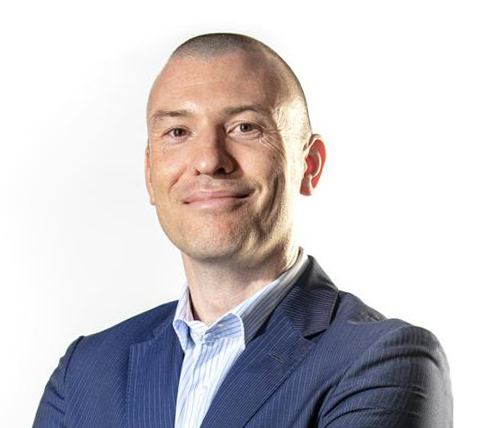Looking to transition to an asset-light business model, Ooredoo Group has been applying digital technologies internally to fulfil more agile ways of working and rolling out new customer solutions and 5G technology. Nigel Byrne, Chief Technology Information Officer, Ooredoo Group, outlines the group’s focus and how the company is using the power of digital technology to transform the business, drive customer acquisition and ensure that it delivers outstanding services and customer experiences.

Talk us through your role as Chief Technology and Information Officer (CTIO) at Ooredoo Group?
I lead the technology organisation in Ooredoo Group. We are responsible for defining the network and IT strategies and architectures to support the efficient delivery of the company’s business objectives and meet our customers’ expectations across the different markets in which we operate.
What are some of the IT initiatives, projects, and implementations you have overseen since taking on your role as CTIO at Ooredoo Group?
In Ooredoo Group we focus on the strategic programmes that help our operating companies achieve their business goals.
One initiative that we announced just recently was a partnership with Ericsson as our next-generation Digital Transformation partner for Business Support System (BSS) solutions. This five-year partnership will witness the deployment of the latest Ericsson BSS solutions across several Ooredoo operating companies. This will give us a new set of capabilities across the customer, product, revenue and service management domains of our business operations.
Also, we are transforming our Enterprise Support Systems (ESS), such as Financials, Procurement, and HR and moving them from a legacy technology to a modernised platform on the cloud. This is for all Ooredoo Group and all our operating companies. This will help us to standardise our internal processes and systems.
Technology innovation is also being applied to improve our business and network operations. Artificial Intelligence (AI), Machine Learning and automation are being applied across our organisation where it fits. For example, we recently started “Smart Network Planning” to enhance the efficiency of network investment decisions through use of Machine Learning algorithms.
Also, we are increasingly using digital technologies to engage with our customers and improve their customer journey and experiences. By introducing digital technologies, we are making it quicker and easier for customers to find, buy and use our services online which also reflects positively on our business.
Finally, for our employees, we have migrated them to Microsoft 365, which is enabling a flexible “Digital Workplace” culture empowered by Microsoft’s collaboration tools. Ooredoo Group is one of the first in the region to implement this type of agile digital working culture and we hope that it will ultimately be a significant competitive advantage.
The role of a CTIO has evolved over the years with more C-level and business line executives getting involved in making IT decisions and formulating the overall technology strategy. How hard or easy is it for you to get the correct support and buy-in from your C-Suite peers at Ooredoo Group?
Ooredoo Group’s C-suite fully recognises the power of digital technology to transform our business, drive customer acquisition and ensure that we deliver outstanding services and customer experiences.
We have embarked on a Digital Transformation strategy that has only been accelerated by the COVID-19 pandemic, and which is leading to sustained improvements in the financial performance of our business.
One area where our operating companies have been particularly keen to adopt the latest technologies is in business services. Among business customers, we have seen a significant increase in demand for cloud services as more people work remotely. Based on this, several of our operating companies have strengthened their partnerships with global cloud service providers such as Microsoft.
Microsoft Azure Cloud has been hosted in Ooredoo Qatar data centres since 2020, but we have expanded this partnership to cover Kuwait from April 2021 and we believe these types of technology partnerships offer huge potential for us in the future.
Which telecoms equipment vendors is Ooredoo Group working with to roll-out its 5G network and where is the company at on its Digital Transformation journey?
5G is an amazing breakthrough that will drive Ooredoo’s business for years to come. Ooredoo Group was one of the first companies to launch a 5G network in Qatar in 2018 and we continue to roll-out 5G across our global footprint. Today, we offer commercial 5G services in Qatar, Kuwait, Oman, the Maldives and Indonesia, where we recently launched 5G in the cities of Jakarta, Solo and Surabaya.
5G offers drastically improving speeds and lower latency, but it is the amazing and varied use cases for the technology across sectors and industries that I believe makes it so revolutionary.
Currently, Ooredoo Group is working with a variety of partners across its operating markets to roll-out 5G services. These include major technology companies like Ericsson, Huawei and Nokia to name just a few.
At the beginning of this year, we signed a global agreement with Ericsson for the supply of 5G radio, core and transport products and solutions, as well as related implementation and integration services for all 10 markets.
Most recently, in Indonesia, we deployed spectrum sharing technology solutions from Ericsson and Nokia. The Ericsson Operations Engine and equipment from Nokia’s AirScale product range aims to increase speeds and widen mobile coverage for our customers. These solutions have also enabled us to use our existing 4G networks for 5G services, decreasing the time it takes to get 5G up and running in Indonesia.
Partnering with global technology players has allowed us to amplify and accelerate our Digital Transformation and we are hopeful that these strategic collaborations will enrich the digital lives of our customers for many years to come.
Talk us through what the rollout of 5G means for Ooredoo customers and what sort of digital services can they expect from your company that they were not getting in the past?
The applications and use cases of 5G are wide ranging and impressive. Ooredoo Group recently announced the deployment of our ground-braking 5G network at Hamad Port in Qatar. This milestone means that Hamad Port is the first 5G-enabled seaport in the Middle East, powered by Ooredoo. Key operations at the port will now benefit from ultra-fast speed, low latency and real-time data that can be used for remote crane and rubber-tyred gantry operations, connected assets, remote inspection and maintenance, data centre connectivity and more.
We are also preparing to deploy 5G at the upcoming FIFA World Cup Qatar 2022 and the FIFA Arab Cup Qatar 2021. Ooredoo was recently named the official Middle East and Africa (MEA) telecommunications operator at these major events and our innovation, technology and experience will enable delivery of the required network speeds and reliability to ensure fans can stay connected while enjoying the spectacle. But we are also going further and preparing to use 5G-enabled applications, such as Augmented Reality (AR), to enhance and transform the fan’s experience in ways never tried before.
5G also has the potential to accelerate the uptake of more data-intensive entertainment applications and we are now exploring HD mobile video streaming, mobile gaming, virtual reality 360 experiences and in-car entertainment.
Looking further to the future, Ooredoo Group is also trialling other amazing potential use cases such as aerial driverless taxi, 5G services in moving vehicles, a 5G drone for smart surveillance, and an ambulance offering 5G-enabled remote medical services. These applications really highlight the transformative potential of 5G technology in the years ahead.
What other technology innovation initiatives are you pushing within the Ooredoo Group?
Even in developing markets where 5G is not yet available, our customers need – and demand – video-grade networks and we are continuing to take steps to enhance the performance of our 4G networks.
Online entertainment is an important area for us, and we have seen a huge increase in demand during the COVID-19 pandemic. In response, many of our operating companies have established content partnerships with the likes of Netflix, BeIN, OSN and Disney+ to offer entertainment packages.
We’re also refreshing our mobile financial services, which have become a major part of our ecosystem, particularly in emerging markets. Markets such as Iraq, Algeria and others have very undersubscribed banking systems, and so we are seen in these markets as a strong, respected brand. This reputation is helping us change the narrative from being a traditional telco to a telco operator that is also able to offer mobile financial services.
Finally, we are also taking steps to accelerate digitalisation among our enterprise customers. For example, in November Indosat Ooredoo and Google Cloud announced a new strategic partnership to accelerate Digital Transformation across consumer and enterprise segments in Indonesia. Through this partnership Indosat Ooredoo will offer small and medium sized businesses new cloud-based, and 5G enabled digital solutions that will empower new business models and enable them to tap new markets and opportunities.
The Middle East and in particular GCC, has witnessed a heightened wave of cyberattacks in recent months targeting sectors like banking and financial services, telecoms, education, and government. How is Ooredoo Group protecting its digital assets and most importantly client information that it doesn’t fall into the hands of cyber criminals?
Ooredoo Group takes cybersecurity and data protection very seriously. We offer our customers a suite of managed cybersecurity services, including a managed security operations centre that provides comprehensive security support and assistance in the event of an attack. Our cybersecurity products also include firewalls, malware protection, vulnerability management, cloud web security, and a distributed denial of service (DDoS) mitigation suite. We can also provide security experts for consulting and management support, who can be based on-site at customers’ premises if required.
How much of your IT infrastructure is on premise versus that which is hosted in the cloud?
While most of Ooredoo Group’s IT infrastructure is still located on premises, we are hosting some customer facing applications in the cloud. Currently we are exploring the best use cases to migrate more of our infrastructure to the cloud, while at the same time ensuring compliance with relevant regulation.
For example, as part of Indosat Ooredoo’s recently announced partnership with Google, we will modernise our infrastructure and applications on Google Cloud to help create a cloud-first organisation. Specifically, we aim to define a clear roadmap for the use of advanced data analytics and AI/ML to improve Indosat Ooredoo’s core operations, costs, and customer experiences and identify and maximise new business opportunities for the future
What is the business outlook for Ooredoo Group in the next 18 months?
Ooredoo Group had a good first nine months of 2021, with revenue increasing by 3% and EBITDA by 7% year-on-year, as we accelerated our Digital Transformation strategy. Looking ahead, we remain optimistic about Ooredoo Group’s potential, and we believe that we are on track to continue delivering growth.
We expect to see demand for content, entertainment services, faster broadband, and larger mobile bundles continuing to grow. The pandemic has greatly accelerated demand for online entertainment, and we continue to identify new content providers.
Our growth will also be driven by our strategy to create more value from our infrastructure portfolio as we transition to an asset-light model. In-line with this strategy, in March 2021 we announced the sale of over 4,200 telecoms towers in Indonesia, in a landmark deal valued at over US$750 million.
Through digitalisation and our transition to a more asset-light model, we aim to build on our growth and lead the way in Digital Transformation across our global footprint.


